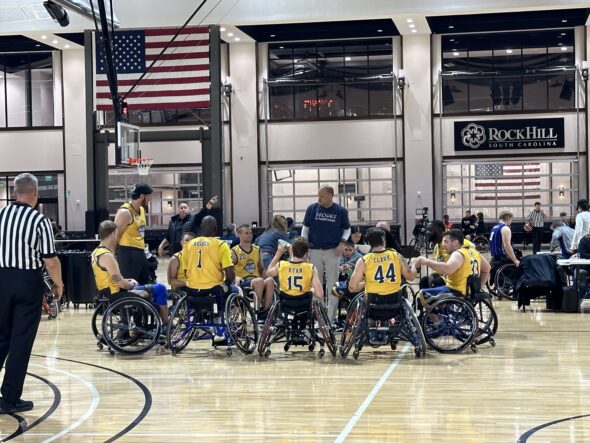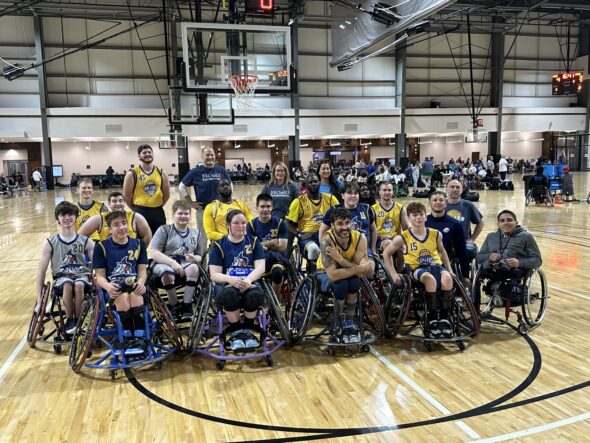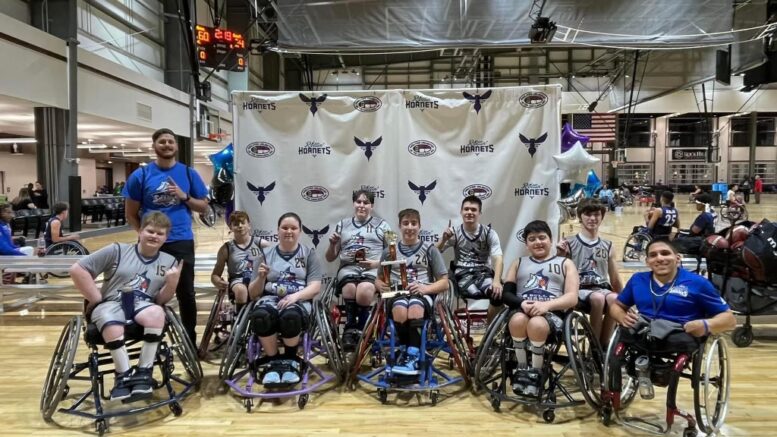By Lauren Montano
On a late Thursday night in Jacksonville, the Brook’s Rehabilitation center basketball court is abuzz with action. Players either in blue or white jerseys played a scrimmage against one another, yelling, laughing, high-fiving each other with every basket. It seems like a regular basketball practice, except for one detail: the players are wheeling across the court instead of running.

A Jacksonville based wheel chair basketball team, the Brook’s Ballers are apart of, and sponsored, by Brook’s rehabilitation center.
Matt Sechrist is one of the founding members of the Jacksonville Brook’s Ballers wheelchair basketball team.
“Where I’m from in Pennsylvania, there wasn’t adaptive opportunities as local or as broad,” Sechrist said. “My family happened to visit this area on vacation the year prior through a family friend, that’s how I found out about the program initially.”
Zach Katzer is another current player on the Brooks Baller and Sechrist’s teammate.
“A lot of people actually come to Jacksonville just for Brooks,” Katzer said.
Sechrist moved down to Florida from Pennsylvania at around 15 years old back in 2009. He had previously played adaptive basketball in his home state of Pennsylvania.
“I had found the program online, so I knew about Brooks Adaptive Sports, and basketball was a favorite sport of mine since Pennsylvania, so I knew I wanted to play. I’ve been down here ever since,” Sechrist said.
Since its founding, the Brooks Ballers are now on their 10th or 11th season. The team typically plays competitively from October to March, but practice all year round to stay conditioned. The ballers have even won national championships, winning the Division III wheelchair basketball national championship in the 2019-2020 season.
The Brook’s ballers may play for Brook’s rehabilitation center, but the team’s achievements go far beyond that. The Ballers are apart of the NWBA, the National Wheelchair Basketball Association, and have competed across the United States.
Sechrist has traveled with the team to locations around the country such as Kansas, Texas, Alabama, Georgia, North and South Carolina, and all around the state of Florida.
“It’s [NWBA] like the NBA but National wheelchair basketball association, so it encovers and entire organization of teams throughout the country,” Sechrist explains.
As for the sport of basketball itself, not much of the rules have been changed.
“The court dimensions, you saw the baskets and everything all the shots were the same,” Sechrist said. “Three second rules are the same, the concept of dribbling and traveling is the same. Two steps in a dribble is legal in able bodied, so it’s two pushes and a dribble in wheelchair basketball. Same concept.”
The team is an important part of the player’s lives. Despite the roster constantly changing due to player’s frequently recovering and leaving the rehabilitation center, the team forms a bond and brotherhood.
“I’ve been proud of the guys that come together, you know, we do really well during the season. Like we said we won a championship. Definitely proud of the guys every season that their able to be here and put in” Sechrist said.
There is no lack of passion from the team, with Katzer sharing his deep love for the sport.
“I’d say this is one of the few things that would get me to give up my free time,” Katzer said, laughing. “I don’t have a ton but, I mean I just love it.”
He said he plays three nights of his weeknights after work to come do this, and that it has always been a joy since he first started.
“I’m really upset it took me until I was 24 years old to find it,” he said.

With this upcoming 2023-2024 season, the Ballers have high aspirations for the team.
“I think one of our big goals is to attend five tournaments, not including Nationals,” Katzer said. “Last year we had an issue getting a lot of guys to commit because since we do travel, it is quite expensive if you don’t have Brooks help with that.”
Despite the challenges the team has faced the Brooks Ballers have team goals that they are hoping to achieve in future seasons.
“So if we could have everyone attend five tournaments and do well, I think that would be good, and to qualify for Nationals, that’s only ten games we should be able to do that in two tournaments. If we could do five tournaments and qualify for Nationals I think that would be a successful season for us this year,” Katzer said.



Be the first to comment on "The normality behind adaptive basketball"